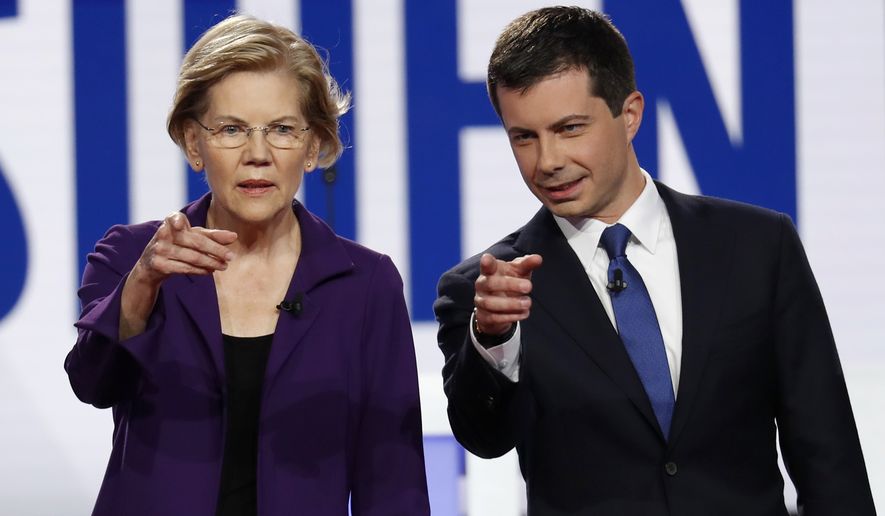DES MOINES, Iowa — Pete Buttigieg could be on the losing side of the debate over whether a woman or a gay person is more likely to shatter the glass ceiling in presidential politics.
The political message of the former South Bend, Indiana, mayor is hitting home with Democrats across Iowa, particularly in the more conservative areas of the state that are worried about the party moving too far left.
Mr. Buttigieg’s homosexuality, though, is giving many Iowans cold feet.
Grant Dyer said Mr. Buttigieg is his favorite candidate but acknowledged worries that the former mayor can’t beat President Trump in an election “because he’s gay.”
“I really admire Pete, but I just don’t think he can win,” said Mr. Dyer, who is leaning toward supporting Sen. Elizabeth Warren of Massachusetts. “There’s too many people who think that is a horrible, awful, thing — ’Oh my God.’ “
His wife, Susan, nodded in agreement. “A lot of people aren’t ready for it,” she said.
Overshadowing the question of whether the nation is ready for a gay president has been a debate over gender and electability. Ms. Warren thrust the subject to the forefront by accusing Sen. Bernard Sanders of telling her in private that a woman could not win the White House.
With the first round of voting just over the horizon, Ms. Warren and her allies are leaning into her womanhood, betting she has more to gain than lose from playing the sex card.
“Elizabeth Warren runs through airports and runs through train stations, and she is a woman on a mission,” Rep. Debra A. Haaland, New Mexico Democrat, told the crowd that came out to see Ms. Warren at a recent event in Newton. “She is a woman who will win the White House.”
Ms. Warren has repeatedly said, “I will do everything, and I love saying this, a president can do all by herself.”
Mr. Buttigieg isn’t emphasizing his sexuality.
Instead, he wraps it into broader messages about freedom, the power of politics and the role that Iowa plays in political history — including in 2009 when the state Supreme Court made Iowa the third state in the U.S. and the first in the Midwest to legalize same-sex marriage.
“I am standing here in a state that 10 years ago — sending a message from right here in the American heartland — made it possible for my marriage to exist, and with your help I might be standing in the state that will make history by making me the next nominee and next president of the United States,” Mr. Buttigieg said at a recent campaign stop.
The strategy makes sense.
An analysis of likely Iowa caucusgoers found that 40% of voters said Mr. Buttigieg’s homosexuality would make it difficult for him to win the presidency, compared with 32% of voters who said gender bias hurts Ms. Warren’s chances.
“The raw numbers would suggest that fewer people in Iowa think being a woman makes it more difficult than being gay makes it to win, and that difference is substantial,” said the study’s author, David Redlawsk, a political science professor at the University of Delaware and co-author of “Why Iowa?”
He said the evidence is clear that Iowa voters see being gay as more of a barrier than being a woman.
Mr. Buttigieg has been fading in Iowa polls since the beginning of the year and sits in fourth place a little over two weeks before the caucuses, according to the Real Clear Politics average of recent polls.
Ms. Warren also has been sliding. Some voters attribute her declining numbers to sexism.
“There is the ’woman’ thing,” said Joy Olsen, a 41-year-old Warren supporter. “Misogyny is an issue.”
Still, it is easy to come across voters backing Ms. Warren not in spite of, but because of, her gender.
“When the caucuses started, I looked at the candidates and I instantly eliminated the men, honestly,” said Taylor Blair, a member of the Iowa State University College Democrats. “I like all the women who are in the race, then I narrowed it down, and I like Warren because she is the most progressive.”
Mr. Blair said Ms. Warren likely started emphasizing her gender in the hopes of tapping into the lingering frustration from 2016, when voters put it all on the line for Hillary Clinton.
“I think a lot of people feel like after 2016 that there was unfinished business when it comes to electing the first woman president,” he said.
Larry Anderson, another Warren supporter, described her gender as “great plus” in his decision-making process.
“I think the last election cycle proved that a woman could get enough votes to win, and I think Elizabeth is a stronger candidate than Clinton was,” the 68-year-old said.
The nomination race, however, could be decided by voters who are mulling over whether Mr. Trump’s no-holds-barred approach to politics could be too much for Mr. Buttigieg.
“At one point, Trump is going to come out and call him a fairy or something like that, and that could work against him,” 75-year-old Rush Holder said at a recent Buttigieg rally in Sioux City.
Perry Miller praised Mr. Buttigieg after seeing him at a rally. He likened the candidate’s youth and vigor to that of John F. Kennedy, the nation’s first Catholic president.
“He is going to have trouble with the whole gay thing,” he warned.
“A lot of people have trouble getting over that. I personally don’t,” the 60-year-old said after attending a Buttigieg rally. “How is it going to be introducing the first man in the White House?
“I see that as a hurdle,” Mr. Miller said. “I hope he can clear that hurdle, but it is a high hurdle. It is not a low hurdle.”
• Seth McLaughlin can be reached at smclaughlin@washingtontimes.com.




Please read our comment policy before commenting.